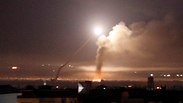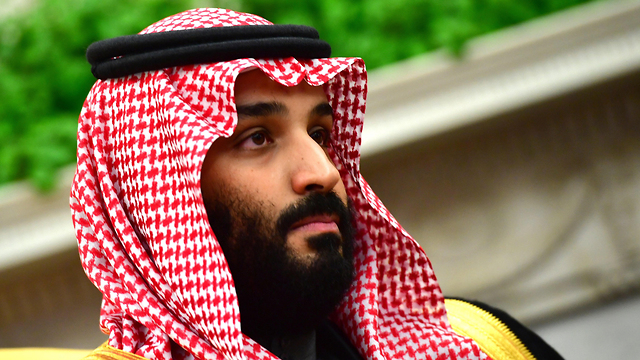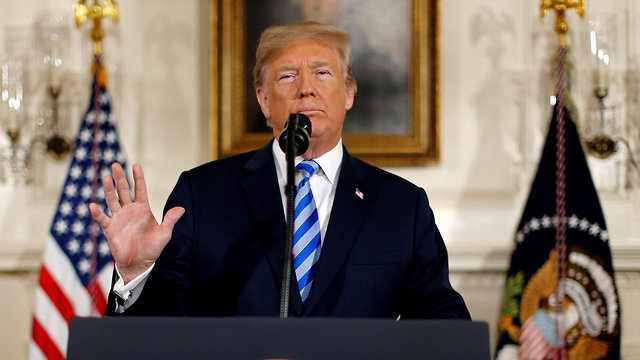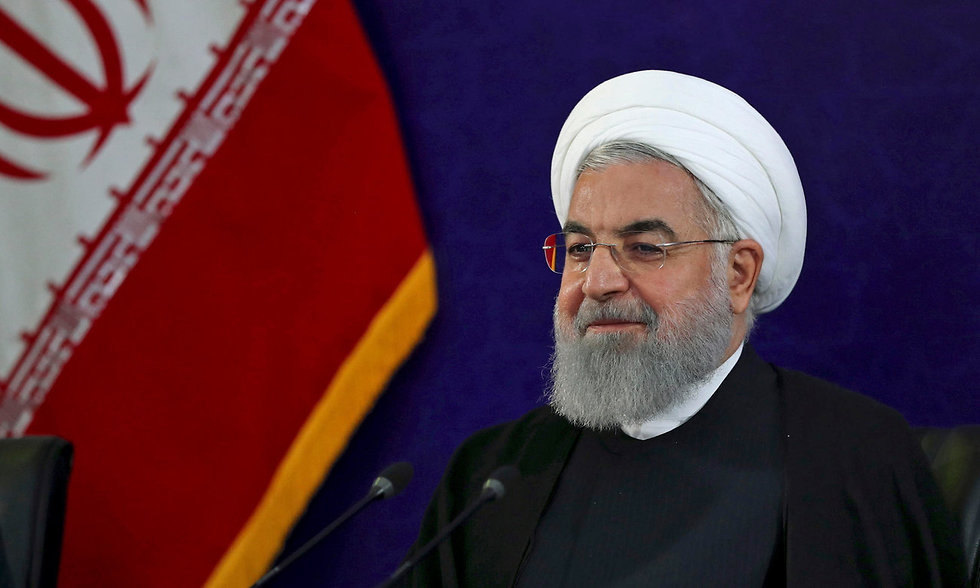
Israel or Iran: Who’s the Arab world’s real enemy?
Analysis: Israeli-Iranian conflict in Syria is seen by Arab press as beginning of first war between Israelis and Persians. Many Arab commentators avoid condemning Israel, say Islamic Republic is on the brink of economic collapse.
US President Donald Trump’s announcement that his country was withdrawing from the nuclear agreement with Iran, and the war that began between Iran and Israel on Syrian territory, point to the major differences of opinion and rift in the Arab world, which has been watching the events from the sidelines up until now. Who’s in favor of Iran and who isn’t? How will the war end, according to the commentators?
An Israeli military advantage?
Is the Arab press telling the truth?
Here’s an example from May 10: “The Israelis are panicking over the Iranian missiles and hiding in bomb shelters. The damage isn’t being reported.” (Pro-Iranian Lebanese television channel Al-Mayadeen)
“The Syrian air defense system shot down all the missiles fired from Israel one after the other.” (Syrian news agency SANA)

On the other hand:
“Iran’s bases in Syria are showered with missiles.” (Qatar-based broadcaster Al-Jazeera)
“The biggest Israeli strike on Syrian territory hit Iranian arms depots and radars.” (Saudi-owned Al-Arabiya television news channel)
Trump’s declaration created an absurd situation: Saudi Arabia, Bahrain and the United Arab Emirates (UAE) supported the declaration, while Britain, France and Germany lined up against the United States.
Saudi commentator Abdulrahman al-Rashed wrote, “The European countries that are interested in the agreement with Iran couldn’t care less about the price the region’s countries are paying. They must decide if they’re with us or with Iran.”
A suspected enemy vs. a definite enemy
Anwar Eshki, a retired intelligence officer in the Saudi army and head of the Middle East Center for Strategic and Legal Studies, irritated many in the Arab world recently when he wrote on Twitter that Israel was a suspected enemy while Iran was a definite enemy. He explained that Israel hadn’t fired a single bullet at Saudi Arabia, while Iran kept firing missiles at the kingdom and even at the holy city of Mecca through the Shiite Houthi rebels in Yemen. He didn’t rule out a collaboration with Israel, as long as it joined the Saudi peace initiative.

The angry reactions soon poured in from across the Arab world, stating that Israel was still Arab nations' main enemy.
Many Saudi commentators say that many in the Arab media have turned the Palestinian issue into a propaganda tool to justify Iran and forgive its crimes. According to these commentators, not only has Iran not helped solve the problem, but it has caused great damage to the Palestinian issue by arming the Hamas organization. Saudi Arabia, on the other hand, presented a plan for comprehensive peace in the Middle East two decades ago.
‘What about the people suffering at home?’
Most senior Saudi commentators—like Mohammed al-Sheikh, Mishari al-Zaidi and Karim Abdian—say the Iranian regime has never been in such a deep state of distress like it is experiencing these days, pointing to the fact that some 40,000 Iranians—about half of the population—suffer from hunger.
The Revolutionary Guards stole the money that had flown in after the sanctions were lifted three years ago and used it to fund terror and the militias in Yemen, Iraq, Syria and Lebanon, “forgetting about the people suffering at home.”
According to the commentators, the situation in Iran resembles the mood in the country on the eve of the Shah’s fall in 1979: An Iranian currency crisis, high unemployment and inflation rates, bankrupted banks and financial institutions, parliament members calling on the chairman of the Iran’s central bank to resign, and wealthy people fleeing and spending billions outside Iran.
A return of the sanctions will only increase the Iranian people’s frustration and the regime’s distress. According to the Saudis, an “intifada” is already taking place and spreading across Iran, concealed by the Iranian media.
Iran’s dilemma
The commentators believe Iran is facing a difficult dilemma due to the fact that Europe remained in the nuclear agreement after the US withdrawal. If it enriches uranium, the European countries will join the US. Furthermore, Israel and the US will be forced to launch a military operation against Iran, even if they aren’t interested in doing so at this time.
Iran is very disappointed by the fact that the US, despite Trump’s declarations, has failed to pull its forces out of Syria, as well as by the fact that the Russian umbrella of defense is nonexistent when it comes to the battle against Israel.
Hezbollah is busy with the recent elections in Lebanon, and Secretary-General Hassan Nasrallah has already declared that the war between the proxies in Syria has ended (Iran’s Hezbollah and the Saudi-backed rebels, who are allegedly backed by Israel too) and the direct war between the backers (Israel and Iran) is now beginning. According to the Saudi commentators, Iran is now alone in its war.

Ghazi Dahman wrote in the Al-Hayat newspaper last week that Israel was gradually erasing all of Iran’s achievements in Syria, as it has to destroy the Iranian forces near Damascus and Homs before they spread south to Quneitra and the Golan Heights.
Most commentators are quoting Prime Minister Benjamin Netanyahu's remarks as further proof that Iran is misleading the international community. Saudi Crown Prince Mohammad bin Salman has referred to Iran’s supreme leader Ali Khamenei as “the new Hitler” several times, not so much because he loves Israel but because he hates Iran.
Commentator Mohammed al-Sheikh wrote, “The ayatollahs must wake up from their crazy messianic dream and realize that the era of jihad wars, raids, occupations and revolution exports is over. The Iranian leadership must understand, like the Saudi crown prince, that we live in the 21st century and that we must work for the young generation and for progress. The ayatollahs must return to their natural place—the mosques—and let the statesmen take care of politics.”
Pro-Iranian press: War is an Israeli interest
Iran’s supporters in the Arab world sound like the European leaders, arguing that Trump’s declaration cancels a “historic agreement” which was achieved with a lot of effort, sending the region back to the state of instability it was in three years ago.
According to the Lebanese Al-Mayadeen channel (where most commentators are anonymous), Israel bombed Iranian targets “due to its frustration over its proxies’ defeat in Syria, and mainly to avenge the Syrian army’s recent success in clearing the terrorists from the suburbs of Damascus, taking the possibility that the capital will fall into the rebels’ hands off the table.”
According to Al-Mayadeen’s commentators, the Israeli strikes were aimed at dragging Iran to war at an inconvenient time. “But Iran is smart and patient and won’t fall into the trap set by Israel. It will attack at the time and place it chooses.”
Al-Mayadeen and Hezbollah’s Al-Manar channel prefer to talk about Hezbollah’s achievements in the Lebanese parliament elections and the fact that its coalition won a third of the seats in the Lebanese legislature, which they say serves as proof of the Shiite organization’s popularity as Lebanon’s defender against “the Zionist enemy.”
Hezbollah and the Iranian Revolutionary Guards are still in a state of euphoria over the rebels’ defeat in Syria, failing to understand that they are now being faced by an enemy of a different magnitude.
What is Hezbollah’s optimism based on? Do they have a new surprise in store for Israel? Until we find out, we should urge the Israeli government to evacuate sensitive substances and facilities from the Haifa Bay, and the sooner the better.
Dr. Yaron Friedman, Ynet's commentator on the Arab world, is a graduate of the Sorbonne. He teaches Arabic and lectures about Islam at the Technion, at Beit Hagefen, and at the Galilee Academic College. His book, "The Nusayri Alawis: An Introduction to the Religion, History and Identity of the Leading Minority in Syria," was published in 2010 by Brill-Leiden.










